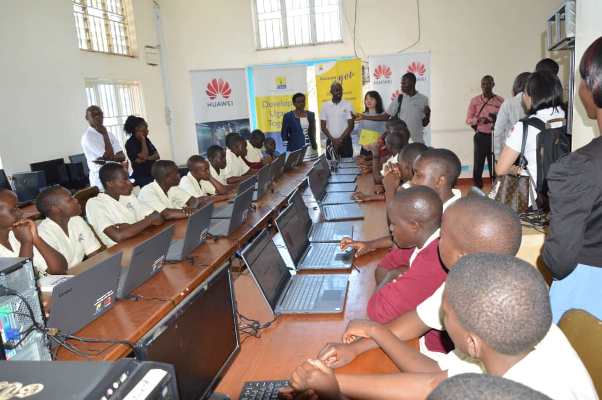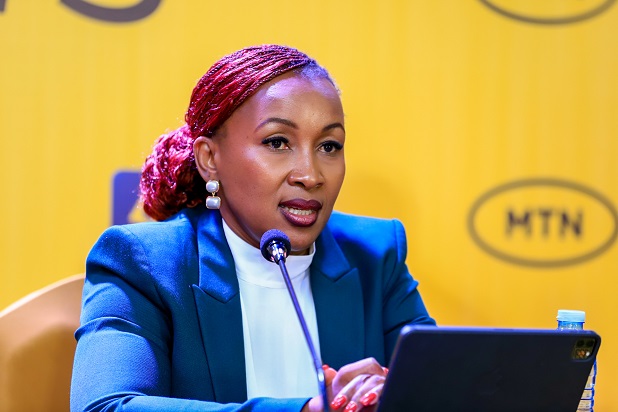Commission Chairperson, Nuwe Amanya Mushega engages with students during his visit to Kololo Secondary School.
Kololo Secondary School students have proposed a change in government policies regarding the use of technology in education to allow them access modern gadgets such as smartphones and laptops to enhance their learning experiences.
The learners made the proposal as part of their contribution to the ongoing education review process in a meeting with the Education Policy Review Commission at their school.
Patrick Nsubuga, a senior three student argued that the new lower secondary curriculum requires learners to conduct research on various topics, but the lack of access to technological devices often limits their ability to do so effectively.
“This situation is causing a lot of frustration and disappointment among us learners. Our limited access to technology devices means that we cannot keep up with our peers who have access to laptops and smartphones. The computers at school are very few and cannot cater for the entire student population. Even during computer classes, the chances of getting a chance to sit before a computer are minimal,” the learner told the commissioners.
The student went on to express his confusion and disappointment with the government’s stance on limiting access to technology devices in schools. He questioned why, in this day and age, the government was still denying learners the opportunity to have essential tools like smartphones, especially when they claimed to be promoting ICT in education.
He boldly stated that there was a solution to the limited access to technology devices that many students were facing. “We urge the policymakers to allow learners to have smartphones. This will enable us to conduct research and access educational materials with ease, empowering us to keep up with our peers and compete on an equal footing.”
Flavia Rose Ayikoru, another senior three student voiced her concerns about the financial ability of many learners to access smartphones and data. She pointed out that a significant number of students at the school come from poor backgrounds and might not be able to afford the necessary gadgets and data.
Ayikoru urged the government to take up the challenge and provide all learners with smartphones that would aid them in their education. She emphasized the importance of digital literacy and the need to bridge the digital divide among students, irrespective of their financial backgrounds.
Kenneth Akol, another student, challenged the government to increase the availability of equipment and computers in schools, especially in rural areas where many learners might have never seen them before.
The issue of allowing phones in schools has been a controversial topic over the past years. In Uganda, learners in primary, post-primary, and some tertiary institutions, such as teacher colleges, are not allowed to have phones on school premises. In some schools, even teachers are not allowed to carry phones while at school.
However, the COVID-19 pandemic has brought out the importance of technology in education, and the use of devices such as smartphones has become more critical. The Ministry of Education finally allowed student teachers in colleges to carry mobile phones while at school.
With the introduction of the new curriculum, the use of smartphones for research and educational purposes was reintroduced. Some schools, including Nakaseero Secondary School, had allowed their students to carry these devices. However, the Ministry of Education issued a directive suspending this move and stating that a policy was needed to guide the usage of phones in schools.
Sam Musingwire, head of the department of mathematics at Kololo Secondary School, believes that the delays in implementing policies on the use of smartphones and other technology devices in schools are causing more harm than good. Musingwire used an analogy of a train to illustrate her point, saying that Uganda is still at the train station while other countries have already boarded the train and are moving ahead in terms of technology in education.
Additional learners noted that neighboring countries such as Rwanda and Kenya have already distributed tablets, smartphones, or laptops to learners in primary schools, leading them to wonder when Uganda will also follow suit. “My mother says that in Rwanda and Kenya, this is already happening. why are they still stopping us from having telephones,” one of the learners told her friends.
According to some learners who were interviewed by this reporter, they already own phones but are not allowed to bring them to school. “When I return home, I use it to search for what they teach us. There are good materials on YouTube, actually, there are full lessons from teachers who are better than ours,” they said. Learners also expressed concerns about the issue of examinations, aside from the matter of technology devices.
During the commission’s visit, Racheal Nyabong, a senior three student, raised a concern about the fairness of the current UNEB examinations. She argued that it is unjust to administer a common examination to learners who have been educated in different environments. Nyabong believed that students from well-resourced schools with access to equipment and books would have an advantage over those from poor, rural areas who lack such resources.
The statement made by a senior three student regarding the fairness of UNEB examinations left the commission members surprised. However, this has been a frequently discussed topic with many people calling for reforms in the assessment process.
Some individuals have proposed that UNEB exams should be abolished entirely, and learners should be assessed through continuous assessment methods. Others have advocated for regional exams to ensure that each learner is evaluated based on the realities of their particular region.
The examination system in the country has been identified by teachers as a root cause of dishonesty and poor curriculum implementation. Edward Kanoonya, headteacher of Kololo SS emphasized that schools focus solely on exam preparation, neglecting physical and motor skills development.
To restore education standards, Kanoonya proposed that the Uganda National Examinations Board should cease the practice of releasing individual school and student results to the media. He argued that this practice contributes to the degradation of the education system, with many schools resorting to cheating and coaching students to boost their results and attract more enrolment.
This was the inaugural visit of the Nuwe Amanya Mushega-led education policy review commission to a school, and they have scheduled visits to additional schools in Kampala this week, as well as other regions of the country in the near future.
-URN





